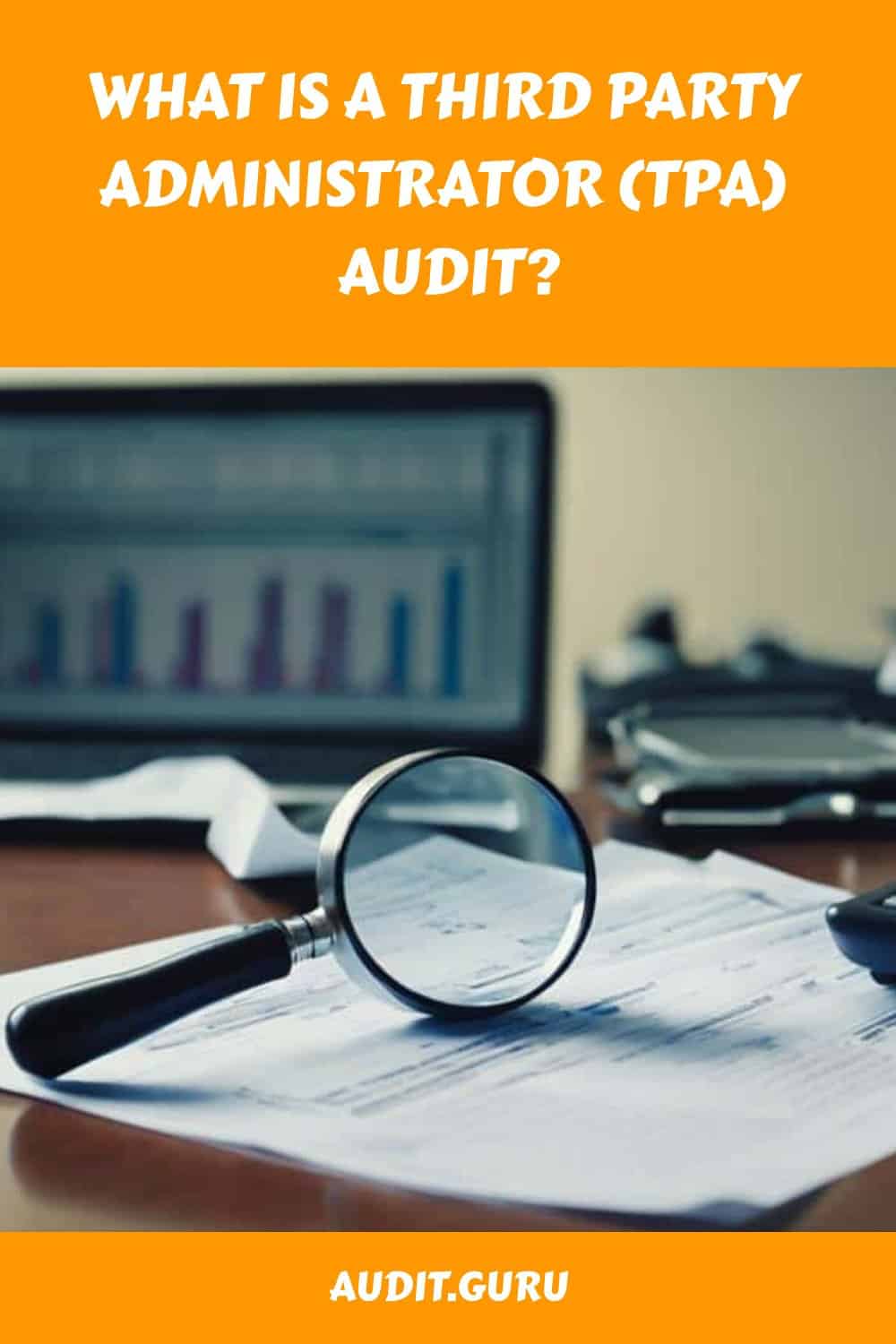- Key Takeaways
- Defining Third Party Administrators
- Purpose of TPA Audits
- Risks of TPA Operations
- Audit Methodologies
- Frequently Asked Questions
- How Can a TPA Audit Impact the Relationship Between Insurance Companies and Their Clients?
- What Are the Specific Qualifications and Credentials That Auditors Need to Possess to Conduct TPA Audits Effectively?
- How Does Technological Advancement Affect the TPA Audit Process and Its Outcomes?
- Can a TPA Audit Reveal Opportunities for Innovation and Process Improvement Beyond Compliance and Risk Management?
- How Does the Frequency of TPA Audits Influence the Long-Term Operational Efficiency and Financial Health of TPAs?
- Conclusion
Navigating insurance claims and management, you’ve likely encountered the concept of a Third Party Administrator (TPA) audit, a crucial checkpoint in the insurance industry.
As you’re aware, TPAs handle claims and administrative tasks, but ensuring they do so effectively and in your best interest requires a closer look. A TPA audit peels back the layers, examining the effectiveness, compliance, and efficiency of these administrators.
You’re on the brink of uncovering how these audits can not only safeguard but potentially enhance your operations. Let’s explore why understanding the intricacies of a TPA audit could be a game-changer for your business.
Key Takeaways
- A TPA audit verifies compliance with regulatory standards and ensures accurate claims processing.
- It identifies operational improvements and reinforces trust in the TPA’s capabilities.
- The audit process involves reviewing internal controls, testing transactions, and assessing regulatory compliance.
- Outcomes from a TPA audit help negotiate better terms, make informed decisions, and safeguard interests.
Defining Third Party Administrators
In today’s complex insurance landscape, Third Party Administrators (TPAs) play a crucial role by managing claims and providing cost-effective solutions to businesses.
You’re likely seeking autonomy and efficiency in handling insurance claims, and that’s precisely what TPAs offer. They’re not just any service providers; they’re your gateway to navigating through the maze of claims processing without getting bogged down by the intricacies.
By outsourcing to TPAs, you’re not just cutting costs; you’re also ensuring that your claims are handled by experts who live and breathe insurance. This means you’re free to focus on what you do best, running your business, while TPAs take care of the rest.
It’s a smart move for anyone looking to streamline their insurance processes and retain a sense of freedom in managing their affairs.
Purpose of TPA Audits
While outsourcing to TPAs offers significant benefits, it’s crucial to ensure their processes align with your business’s standards, making TPA audits an essential step. These audits allow you to maintain freedom over how your business operations are managed, ensuring that you’re not blindly trusting another entity with critical aspects of your operations.
Here’s why TPA audits are vital:
- Verify compliance with regulatory standards
- Ensure the accuracy of claims processing
- Assess the security of sensitive data
- Identify opportunities for operational improvements
- Reinforce trust in your TPA’s capabilities
Risks of TPA Operations
Many TPAs handle a vast array of sensitive claims, exposing your business to various operational and compliance risks. When you outsource, you’re putting your trust in another entity to manage intricate details that, if mishandled, could lead to serious financial and reputational damage.
You’re also dealing with the maze of regulations governing the insurance industry, making compliance a critical concern. Mistakes in claims processing or failing to meet regulatory standards can result in hefty penalties, not to mention the loss of customer trust.
You must stay vigilant, understanding that while TPAs offer freedom from daily claims handling, this delegation comes with the need to monitor and manage the risks involved diligently.
Audit Methodologies
Understanding the risks TPA operations pose, it’s crucial to explore the methodologies auditors employ to scrutinize these entities effectively. You want freedom from worry about your outsourced processes, and a thorough audit can provide that peace of mind.
Here’s how auditors dig deep:
- Comprehensive Review of Internal Controls: Evaluating the effectiveness of the TPA’s internal controls over claims processing and data security.
- Transaction Testing: Sampling specific claims to verify accuracy and compliance with policies.
- Interviews and Observations: Talking with staff and observing operations to gain insights into daily practices.
- Risk Assessment: Identifying potential vulnerabilities in the TPA’s processes that could lead to financial or reputational damage.
- Regulatory Compliance Check: Ensuring that the TPA adheres to all relevant laws and regulations, offering you freedom from legal headaches.
Insights From Audits
A TPA audit’s insights can significantly enhance your understanding of how effectively your outsourced claims are being managed. These audits dive deep, uncovering the nitty-gritty of operational efficiency, compliance adherence, and the accuracy of claim settlements.
You’ll discover areas where your TPA excels and where there’s room for improvement. This knowledge empowers you to make informed decisions, ensuring that your claims management aligns with your expectations and regulatory requirements. It’s about taking control and ensuring that your partnership with a TPA adds value, rather than complicates your processes.
Armed with these insights, you’re better positioned to negotiate terms, implement necessary adjustments, and ultimately, safeguard your interests and those of your clients. It’s your right to demand excellence and transparency in every aspect of your claims management.
TPA Service Overview
To effectively manage your insurance claims, it’s essential to familiarize yourself with the comprehensive services offered by Third Party Administrators (TPAs). TPAs provide a range of solutions that free you from the complexities of handling claims in-house, allowing you to focus on what matters most to you.
- Policy Administration: They handle the day-to-day management of policies, ensuring that all your paperwork is in order.
- Customer Support: TPAs offer dedicated support to resolve any queries or concerns.
- Data Management: They manage and analyze data to help you make informed decisions.
- Compliance Assistance: TPAs ensure that your claims processing adheres to all regulatory requirements.
- Billing and Payment Services: They streamline the financial aspects of claims handling, ensuring timely payments and accurate billing.
Embrace the freedom and efficiency that TPAs bring to managing your insurance claims.
Claims Management
Building on the foundation of TPA services, let’s explore how they manage claims, a critical aspect of their offerings.
You’re seeking freedom from the cumbersome tasks of claims handling, and TPAs offer just that. They dive into the intricacies of various claims, from professional liability to property damage, ensuring each is handled with precision and care.
You’re not bogged down by the details; instead, you’re free to focus on your core operations while they efficiently manage the claims process. TPAs provide a seamless experience, swiftly navigating through claims evaluation, processing, and settlement.
This freedom from the day-to-day claims management allows you to breathe easier, knowing that experts are at the helm, guiding you toward a resolution without the usual headaches.
Compliance and Regulations
Navigating through the complex landscape of compliance and regulations, you’ll find that TPAs must adhere to a stringent set of rules when processing claims. This ensures fairness and integrity in the handling of your insurance benefits. You deserve the freedom to expect transparency and accountability from these administrators.
Here’s what you should know about compliance:
- TPAs are bound by federal and state laws to protect your rights.
- They must follow strict privacy regulations to safeguard your information.
- Accurate and timely claim processing isn’t just a courtesy; it’s a requirement.
- Regular audits confirm that TPAs meet or exceed industry standards.
- Failure to comply can result in significant penalties, ensuring they stay on their toes for you.
Frequently Asked Questions
How Can a TPA Audit Impact the Relationship Between Insurance Companies and Their Clients?
You’re wondering how a TPA audit can affect the bond between insurers and clients. It assures you that claims are handled accurately and fairly, strengthening trust and ensuring transparency in the insurance process.
What Are the Specific Qualifications and Credentials That Auditors Need to Possess to Conduct TPA Audits Effectively?
Navigating TPA audits is like steering through uncharted waters; you’ll need a compass. You should look for auditors with relevant certifications, deep industry knowledge, and a knack for detail to ensure smooth sailing.
How Does Technological Advancement Affect the TPA Audit Process and Its Outcomes?
You’re seeing tech advancements transform TPA audits, making processes faster and outcomes more accurate. This shift ensures you’re getting the most reliable service, cutting down on errors and boosting overall efficiency in handling claims.
Can a TPA Audit Reveal Opportunities for Innovation and Process Improvement Beyond Compliance and Risk Management?
A TPA audit isn’t just about ticking boxes for compliance; it’s your ticket to innovation. It uncovers not only risks but also golden opportunities for streamlining processes, sparking creativity, and driving service excellence.
How Does the Frequency of TPA Audits Influence the Long-Term Operational Efficiency and Financial Health of TPAs?
Increasing the frequency of your TPA audits can significantly boost your operation’s efficiency and financial health over time. You’ll catch issues early, ensuring smooth processes and preventing costly mistakes down the line.
Conclusion
In the intricate dance of insurance, where precision meets complexity, TPA audits emerge as the unsung heroes. They’re not just about finding faults but illuminating paths to efficiency and compliance.
You’re standing at the crossroads of risk and reassurance, where every detail matters. By embracing TPA audits, you’re not just ticking boxes; you’re unlocking a treasure trove of insights that can transform your claims management from a routine task into a strategic asset.
It’s about safeguarding your interests while elevating the quality of your services.









